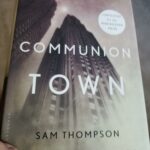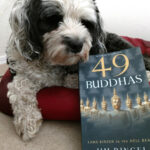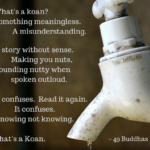A few months ago in a NY Times op-ed, David Brooks laid out a theory. He summarized our current polarization as a battle between Mistake Theorists and Conflict Theorists.
Mistake Theorists—a term coined by Slate Star Codex blogger Scott Alexander—believe that world’s complexities are a product of error and incompetence. Like the way comedians see things, although without the fun of being funny.
The idea is this. Error and incompetence are not necessarily faults as much as our living out a natural chaos. Problems are hard. Solutions evasive. Perfect solutions as scarce as perfection itself.
Mistake theorists believe problem-solving demands messy conversations, prickly compromise, and the acceptance that well-reasoned solutions have unforeseen underbellies crawling and jiggling with new problems to solve.
That’s how the Buddha sees things. Happiness is not solving the world’s problems. Happiness comes from coping with the chaos. Living and even enjoying the incompetence of the random.
Conflict Theorists are much different. They’re angrier. Their worldview is that the world’s problems flow not from incompetence, but from malice and a need to oppress. Conflict theorists view the world as unjust because some form of “other” is actively subjugating the “good”. If only we can defeat the subjugators, peace and justice will rush to fill the void. Debate and reason and nuisance are counterproductive, wishy washy and effete. Defeat the other, and the world will be “ours”.
Mistake theorists and Conflicts theorists do not fit neatly on one side of the political spectrum or the other, neither left nor right. Because the Mistakers and the Conflicters are not two distinct groups, this one and that. Each is each of us. Together they add up to the duality ka-boing-ing around inside every abstract-thinking sentient being.
Because as the Buddha explains, we are never any one thing. Just the diverse interactions we live out in various moments of our lives.
Each of us justice-seekers condemning those we see as unjust.
Each of us our own individual egos, chafing at the other egos around us.
Each is correct. Those who disagree are not. They are the wrong ones.
Our encounters are easily influenced by our subscribed tribe. Our tribe is comprised of an agreed truth, spoken politely, never offensive to our like-mindeds. That we reserve for the other.
Duality explains what a thing is by describing what it is not. Good is the stuff that’s not bad. Might is the stuff that’s not weak. Acceptance is inoffensive.
Living between these dualist extremes is chaos, and chaos is an uncertain place to settle. The ground shifts. The past is misunderstood. The future uncertain. Chaos is usually good for laughs, but not the way to a stable economy.
And so we cling to the tribe. We give knee-jerk blessing to those who sound like we sound. Or more accurately, we bless those who sound how we believe we sound, whether others hear us that way or not.
If the Buddha was here, I am sure he’d explain it all differently. He’d tell a few jokes. We’d laugh. He would remind us that certainty is a construct of rational minds struggling to survive.
And then he’s challenge us to let it go. Quit the tribe. Open to the strangeness around us. Discover the other that lives inside.






